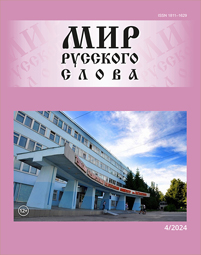Tula linguocultural school
DOI:
https://doi.org/10.21638/spbu30.2024.412Abstract
The article is dealing with the description of the activities of the Tula linguocultural school. Its emergence is largely influenced by the studies of the phraseological school headed by V. L. Arkhangelsky. His students such as V. N. Telia, V. T. Bondarenko, T. V. Renskaya stood at the origins of shaping the experimental and theoretical basis for linguocultural studies. The development of the school was carried out in two directions: the study of cultural principles and concepts, as well as the consideration of linguocultural symbolary. Within the framework of the first direction the linguocultural theory of the concept was profoundly studied, the means of its verbal representation were elaborated. Russian original and borrowed concepts were studied, comparative studies of concept representation in different discourses were undertaken, allowing researchers to see the differences in the conceptualization of naive and scientific knowledge. The second direction of work is connected with the study of verbal signs of culture. The Tula linguocultural school develops the idea of the existence of an intermediate, linguocultural level, which is a consequence of the interaction between language and culture. Words, phraseological units take cultural functions and become cultural signs, among which are defined symbols (quasi-symbols), etalons (quasi-etalons), naive measures (quasi-measures), amulets, brands, emblems. The semiotic nature of symbols and etalons, semantic and pragmatic features, systemic properties, text-forming potential are described. In order to compile the lexicography of linguocultural units, the macro and micro structure of the dictionary is developed. A bilingual dictionary of Russian and Bulgarian symbols was created. The scientific school directs its efforts to popularization of ideas: regularly holds scientific conferences, carries out scientific and methodological work. A number of methodological publications have been developed for Russian language teachers, adapting the linguocultural theory for the school curriculum. The Tula linguocultural school sees the prospects of its scientific research in the study of the thesaurus and symbolary of regional culture.
Keywords:
language, culture, linguoculturology, Tula linguoculturological school, linguistic and cultural unit, concept, dictionary
Downloads
References
Токарев 2020 — Токарев Г. В. Краткий словарь русских лингвокультурных единиц. Тула: ТППО, 2020. 273 с.
Downloads
Published
How to Cite
Issue
Section
License
Articles of "The World of Russian Word" are open access distributed under the terms of the License Agreement with Saint Petersburg State University, which permits to the authors unrestricted distribution and self-archiving free of charge.




